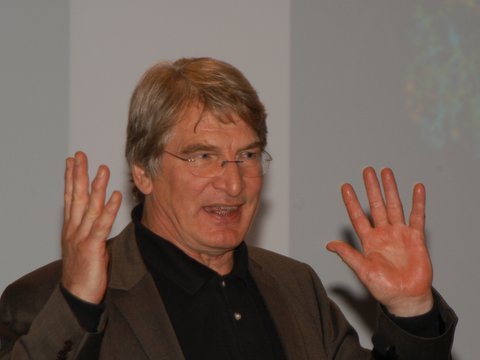
You are here:
IEEE INFOCOM 2013 KEYNOTE SPEAKER

Tuesday, April 16 (9:30 - 10:30)
Room: Auditorium (see map of the rooms here)
Slides available for download.
Title: The Cloud is the future Internet: how can we engineer a cloud?
Abstract:
The future Internet will be a network of data centers. Of course, this is already true today in the sense that most content and services delivered to end users come from a data center of some form or other. We postulate a future where this cloud of compute and storage resources is rationalized to yield a much more economically efficient structure. Users will be attached to the Internet via a data center that, among other functions, will act as router for the small proportion of demand that cannot be handled locally. Independently of this prediction, the performance of data center networks and the cloud is among the hottest topics in networking today. More specifically, researchers are seeking ways to fulfill service level agreements, typically expressed in terms of minimum bandwidth and maximum latency guarantees, in the multi-tenanted cloud infrastructure. This is clearly reminiscent of the huge amount of effort expended over the last decades on trying to solve the issues of Internet QoS. Unfortunately, it seems lessons from the failure of much of that research have still not been widely learnt. We would argue that the main reason for the inapplicability of QoS service models is the failure to take proper account of the random nature of demand. While modelling demand in terms of stationary stochastic processes is a tried and tested approach in engineering many networks and systems, it is hardly ever applied in evaluating schemes for sharing Internet (or cloud) resources. This is unfortunate since, in our experience, it is an approach that brings essential understanding and enables the design of simple and effective traffic control mechanisms. We must gain similar understanding to engineer the cloud. The challenge is to succinctly characterize cloud traffic and then to elaborate models to accurately predict performance for given demand and network capacity.
James Roberts' biography:
I have been doing research on the performance of communications networks for more than 40 years. I didn't expect to have this career when I joined the British Post Office in 1970 with my maths degree to work in the teletraffic division. It turned out that way mainly because I moved to France in 1975 and it was then not easy for me to do anything else like "moving into management". But to earn one's living as a researcher is a huge privilege, bringing great personal satisfaction, and I have thoroughly enjoyed the experience. I am now working at Inria, having left France Telecom in 2009 after a stay of more than thirty years.
The objective of my research has always been to understand the 3-way relation between demand, capacity and performance, accounting properly for the statistical nature of network traffic. Understanding this relation is essential for network engineering but also for the design of effective traffic controls. Fortunately, the context for my research has changed continuously as technology and usage have evolved, with every development bringing new performance evaluation challenges. My latest ambition is to derive an Erlang formula for the Cloud!
An important source of pleasure and satisfaction comes from belonging to an international community of peer researchers. From 1985 to 1996 I was lucky enough to chair three successive COST Actions that brought together a distinguished group of European researchers to work on the design and performance evaluation of multiservice networks. I have been a member of many technical programme committees and editorial boards, always finding reviewing papers to be a rich and rewarding learning experience. I have chaired the TPC of a number of conferences and workshops including Infocom 2003.
I have published quite a lot of papers over the years, often co-authored with some highly gifted colleagues. One paper with Laurent Massoulié gained the best paper award at Infocom 1999. I am proud that my contributions have had some impact and that this has been recognized by my peers. I was a Fellow of Orange Labs and received awards from them for my research. I am a Fellow of the French learned society SEE. I was awarded a "Lifetime Achievement Award" by ITC. I am greatly flattered to have been invited to give the keynote talk at Infocom 2013.
Jim Roberts





